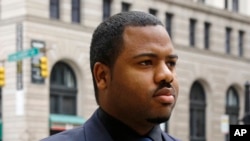A Baltimore, Maryland judge has declared a mistrial in the case of police officer William Porter, charged in connection with the death of Freddie Gray, a young African-American man whose spine was severed in the back of a police van in April.
After three days of deliberations, the jury informed Circuit Court Judge Barry Williams that it could not reach a verdict. Williams thanked the jurors and dismissed them.
Porter had been charged with involuntary manslaughter, second degree assault, reckless endangerment, and misconduct. The jury was deadlocked on all the charges. Jury decisions have to be unanimous.
It is up to the state's attorney to decide what happens next. Porter could be retried or given immunity from further prosecution if he testifies in the upcoming trials of the five other officers charged in Gray's death.
A small group of demonstrators stood across from City Hall after the judge reached his decision. The black neighborhood where Gray lived was also peaceful.
Remembering the riots on the day of Gray's funeral in April, Baltimore Mayor Stephanie Rawlings-Blake said police are prepared to protect the city's residents, neighborhoods and businesses.
She said Baltimore cannot be defined by violence and called on everyone to respect what she called "the American system of justice," where not every case is neatly wrapped up.
Prosecutors allege Porter, who is also black, and the other officers - two of whom are black - failed to help Gray, who suffered a severe spinal cord injury. They called the van a "casket on wheels."
Gray was handcuffed and shackled by his feet, but not buckled in the seat after being arrested. This allegedly caused his body to slam against the side of the van, severing his spinal cord and leaving him in a coma.
Prosecutors say Porter ignored Gray's pleas for medical help and abused his power as a police officer.
The defense calls Gray's death a horrible tragedy, but argued there was no evidence to convict Porter and that there is too much of a reasonable doubt. They also say it was possible Gray deliberately injured himself.
Violence broke out after Gray's funeral, including arson, looting and rocks and bottles thrown at police. Baltimore's black leaders say the riots were not just about Gray but about a city government that has long ignored the needs of poor African-American neighborhoods.
Gray, who had been in trouble with the law in the past, was arrested in April for reasons that are still not entirely clear.





